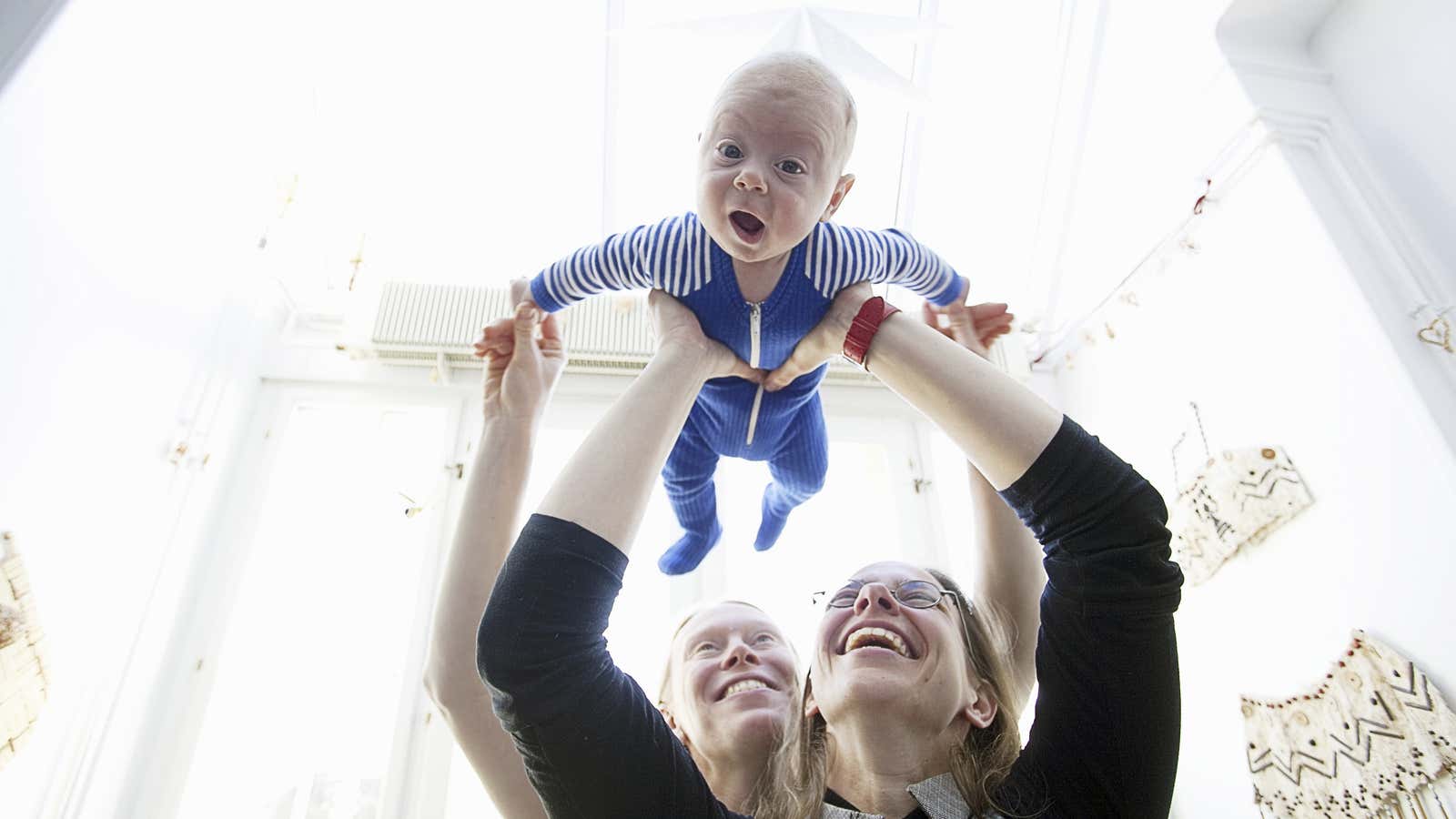Who cleans the toilet in your household? Does one person always mow the lawn? Who is in charge of the accounts?
In partnered households, a division of labor makes sense. But that doesn’t make it easy: Conversations about money can be fraught and housework—or the lack of it—tend to cause some of the worst relationship disputes.
All too often, tasks break down along gender-normative lines, meaning that among opposite-gender couples, women do more unpaid labor than men. If that couple has children, the divide becomes starker—even if both parties are also trying to forge ahead with a career.
But dual-career couples of the same gender tend to split life chores more equally, according to researchers at McKinsey. What’s more, the strategies employed by same-gender couples might be applicable more broadly to all couples trying to make career and home life equitable.
In opposite-gender, dual-career couples, women are twice as likely as men to see their partner’s career take priority over their own, McKinsey wrote in its report, released Monday. Women also do more housework. They might work an equal number of paid hours as their male spouse, but then also often take on a second shift of daily unpaid labor at home. The pandemic exacerbated this, with mothers taking on more of the child care, care arrangements, and homeschooling during work hours.
Women and men also perceive the amount of work they’re doing quite differently: 70% of men in working couples say they do as many household chores as their female partners, but only 42% of women agree, McKinsey found.
McKinsey examined data from over 30,000 people in opposite gender couples and over 900 people in same gender couples, both with and without children, selected from the 65,000 employees surveyed for its 2021 Women in the Workplace survey. They also interviewed 25 couples to gain more insight into the quantitative findings. They found that while 53% of women in opposite-gender couples said they did “all or most” of the housework, only about a quarter of women in same-gender partnerships said so. Same-gender partners were significantly less likely to feel one person had to “downshift” their career after having children.
Same-gender couples appear to value both careers, beyond how much money they brought in, the researchers noted. Same-gender couples’ “approach to household responsibilities often reflects a deep, abiding assumption each partner’s career is equally important—irrespective of who’s the breadwinner,” the authors wrote. —Cassie Werber
Keep reading: Same-gender couples are better at dividing up housework
We want to hear from you
Who does more housework in your household? Have you tried to make your partnership more equal? If you’re not partnered, do you have any tips for those who are?
What else is happening
👘 Digital fashion for your avatar sounds futuristic. But it’s already here and you can wear it to work.
👑 Prince Andrew settled. The duke will pay Virginia Giuffre an undisclosed sum, as well as make a “substantial” donation to her charity in support of victims’ rights.
👓 Can a business education be ethical? We took a look at what MBA programs are doing to prepare students for today’s social and environmental demands.
🌹 Romance isn’t dead. In fact, at work, it’s livelier than ever.
🛌🏾 What’s better than quashing the urge to nap? Taking a nap.
☁️ Life in the cloud. Quartz’s Kira Bindrim and Scott Nover discuss how Google Docs became a tool for collaboration, productivity, even resistance on this week’s Obsession podcast.
Mental health in the workplace
Where are workplace mental health trends headed? How can you bring the newest and best practices into your organization?
Join us Thursday, February 17, 2022 from 11am – 12pm ET (4pm – 5pm GMT) as we unpack these questions in a workshop hosted by Quartz’s Heather Landy.
30-second case study
Thirty years ago, Guatemala was using coffee beans to mend roads. The commodity was so cheap, it was more economical than using gravel.
The Italian coffee company Illy thought about coffee beans differently: Instead of buying the best beans it could at the cheapest prices, it started working directly with coffee growers to perfect the growing and processing of beans, and began paying a premium for the product.
Those relationships have paid off for the Trieste-based brand, says David Brussa, who joined the company in 1991 and is now its quality and sustainability director. Illy and its most trusted growers can move stocks of coffee quickly, and the sampling process before committing to buy is now shorter. When the pandemic struck, everyone felt it: Processes had to be curtailed. But, Brussa says, quality didn’t suffer.
The takeaway: According to Illy, sustainability and looking after multiple stakeholders, not just shareholders, is better for business, and one of the reasons it is so focused on cultivating flexible, trust-based relationships.
You got the Memo!
This week’s edition of The Memo was written by Cassie Werber and edited by Francesca Donner. Please send workplace news, cleaning tips, and virtual work shirts to work@qz.com.
Get the most out of Quartz by downloading our app and becoming a member.
